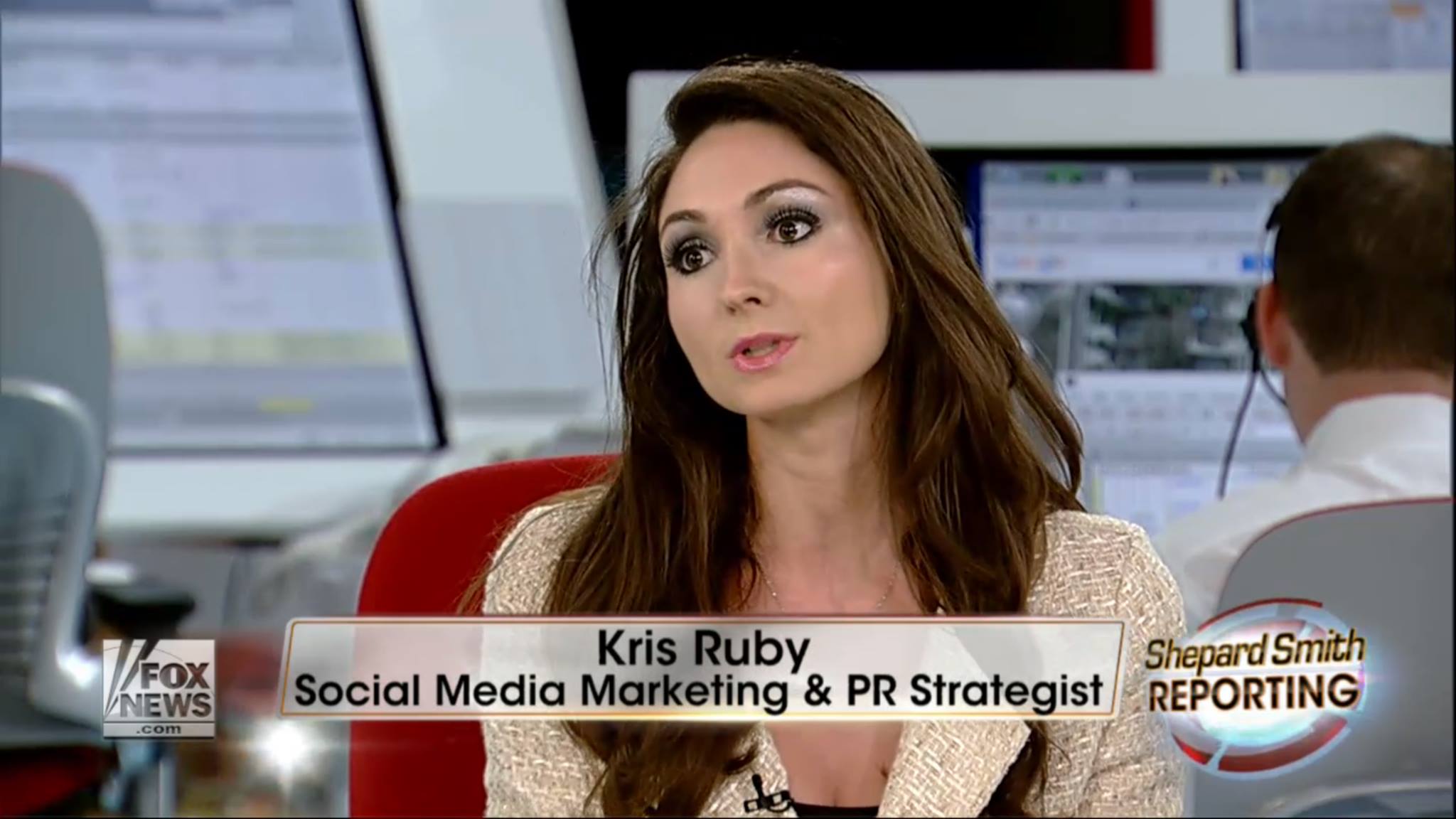|
Getting your Trinity Audio player ready...
|
Social Media Expert Kris Ruby joined FOX NEWS Shepard Smith to share about the new changes to Facebook’s privacy and how users will be impacted.
From now on, there is no way to prevent your Facebook timeline from coming up when someone searches for you by name. When enabled, the setting removes the ability for users to access a Timeline profile via search, even when a user puts in the exact name of the person he or she is locating.
These major Facebook changes impact the larger social media privacy discussion. Facebook says that currently only a “single-digit percentage” of their users had the settings activated. While that may seem low, at 1.2 billion profiles, even at one percent that is still 12 million people who didn’t easily want to be found.
Active users on Facebook who thought they could keep a hidden identity will now need to decide if they should get off the site altogether. This raises the larger question: if you don’t want to be found and don’t want to be social, should you really even be on social media to begin with?
In 2014, people really need to understand if they want to be active on social media they are giving up a certain amount of privacy. This needs to stop coming as a shock to people that are active on these platforms.
Facebook’s Removal of Privacy Settings:

In an era where digital interactions form an integral part of our lives, privacy remains a critical concern for internet users worldwide. Facebook—a leading social media giant—has recently made a significant change by removing a crucial privacy setting that allowed users to hide their profiles from search.
This decision sparked a myriad of discussions, raising valid concerns about online safety, privacy, and the wider implications of increased visibility on social media platforms. In a recent interview on Fox News, social media expert Kris Ruby delved into the removal of the privacy setting, scrutinizing its impact on user privacy and safety, the broader implications for social media privacy, and charting user reactions as well as potential alternatives for those seeking to maintain online privacy.
The Facebook Privacy Setting Removal Saga
On a platform like Facebook, privacy settings play a pivotal role in how users control the exposure of their personal information. Historically, Facebook offered a setting that enabled users to hide their profiles from the platform’s search function, thus making them less accessible to strangers. This feature was particularly valued by users concerned about their online privacy, including individuals seeking protection from social media stalkers and other malicious actors.
Recently, Facebook announced a decision to eliminate this privacy setting. The social media giant justified the removal by citing that only a small percentage of users utilized it. However, given Facebook’s massive user base, this small percentage still translates to millions of accounts. This move has consequently heightened apprehensions about the company’s commitment to safeguarding user privacy and has led many to question the motives behind making profiles more accessible.
The decision to remove such a vital privacy control opens a Pandora’s box of potential risks and threats. The drive to make users more searchable can only fuel larger debates about privacy in the digital age, raising alarms about where the line is drawn between user convenience and safety.
Impact on User Privacy and Safety
The primary concern stemming from the removal of the hide profile feature is the considerable impact on user privacy and safety. For many, the ability to obscure their profiles from search results was seen as a fundamental layer of security. This sentiment resonates deeply with vulnerable groups such as victims of social media stalking or harassment, who deemed this function essential for their personal safety.
With the removal of the privacy setting, every Facebook user becomes more visible and accessible to anyone who wishes to find them. This increased visibility can expose users to unsolicited attention and potential misuse of their personal information. Online predators and cyber stalkers could now have a much easier task in locating potential victims, adding a potentially dangerous dimension to the discourse surrounding online safety.
Additionally, the change could have ripple effects on professional boundaries. Many individuals, including teachers, healthcare professionals, and public figures, relied on this setting to maintain their private lives separate from their public personas. Without a robust mechanism to shield their profiles from searches, they now face increased risks of unwanted attention and breaches of privacy.
The removal undeniably shifts more responsibility onto users to manage their privacy settings proactively. Users now need to be even more vigilant in controlling and monitoring who can see their posts, photos, and personal information. It also underscores the importance of users deploying additional privacy measures, such as meticulous friend list management and stringent review of profile visibility settings.
Broader Implications for Social Media Privacy
Facebook’s decision to make its user profiles more easily searchable reflects a broader trend observed across various social media platforms toward increased transparency and interconnectedness. However, this push for greater visibility isn’t without downsides. It invites critical scrutiny on the balance – or imbalance – of user convenience versus privacy.
This removal is indicative not only of Facebook’s evolving stance on privacy settings but also of the burgeoning commercial interests behind user data. With access to more data, Facebook stands to offer more granular advertisements, enhancing the platform’s appeal to marketers. This pivot underscores the duality of social media: tools for connectivity on one hand and data monetizing machines on the other.
The implications stretch beyond Facebook users. This change brings to light critical discussions about user privacy across all social media landscapes. LinkedIn, Twitter, Instagram, and others have varied privacy protocols, but many have similarly moved toward increased public access to user data. This trend forces users to be more cognizant of what they share and highlights the need for more profound privacy literacy.
Another associated concern is the erosion of user trust. Facebook, in particular, has faced numerous privacy scandals over the past decade, and each incident chips away at the confidence users have in the platform to safeguard their data. The removal of the privacy setting perpetuates this mistrust, emphasizing the necessity for comprehensive reforms and transparent communication from social media companies regarding user data policies.
In a broader sense, these developments raise important questions about digital governance and the ethical responsibilities of social media companies. As platforms become more deeply intertwined with daily life, the onus is on tech companies not only to provide innovative services but also to robustly protect user privacy.
User Reactions and Alternatives
User reactions to the removal of the hide profile setting have been predictably charged. Many users took to various forums and social media channels to voice their dismay and concern. The prevailing sentiment is one of frustration and a sense of betrayal, particularly among those who had relied heavily on the feature for shielding their profiles from unwanted attention.
Some users have expressed intent to leave Facebook altogether, signaling a tipping point in their tolerance for the platform’s continuous shifts in privacy policies. As privacy concerns mount, the ability to find alternative social media platforms or ways to protect one’s digital footprint becomes paramount.
Social media users seeking to maintain their online privacy are exploring different avenues:
- Enhanced Privacy Settings: Adopting more stringent privacy practices within Facebook, such as reviewing friend lists frequently, customizing audience settings for posts, utilizing private groups, and regularly checking privacy settings.
- Privacy Tools: Employing third-party privacy tools designed to enhance digital security, such as privacy-focused browsers, VPNs (Virtual Private Networks), and ad-blockers can offer additional layers of protection.
For users opting to remain on Facebook, proactive engagement with privacy settings becomes ever more crucial. It entails a continuous process of reviewing and adjusting privacy settings and being mindful of the content shared. Educating oneself about potential risks and taking preventative measures is key to navigating the increasingly complex social media landscape.
Facebook itself, while removing this specific setting, continues to offer various other privacy controls. Users are encouraged to leverage features like restricting posts to certain audience groups, hiding individual pieces of content, and using the Timeline Review function to approve tagged posts before they appear on their profiles. Facebook’s Privacy Checkup tool is available to help users review and adjust their settings efficiently.
The removal of Facebook’s hide profile setting has undoubtedly sparked significant concern about user privacy and safety. As users grapple with the implications of this change, the broader narrative underscores a critical pivot point in social media privacy discourse. While Facebook asserts that the move affects a minor segment of users, the impact on those reliant on this privacy setting is profound and undeniable.
Facing increased visibility and necessary vigilance, users must adapt by embracing proactive measures to protect their information. As privacy becomes an ever more complex issue in the digital age, the conversation must evolve to address the balance between connectivity and security. Individuals, tech companies, and policymakers alike must engage in an ongoing dialogue to ensure that the digital sphere remains a safe space for all users.
Ultimately, while the removal of the hide profile setting poses significant challenges, it also catalyzes a crucial examination of our digital behaviors and the systems in place to protect them. By fostering a culture of awareness and prioritizing ethical standards in data privacy, we can navigate the intricate landscape of social media.
Follow Ruby Media Group on X to stay updated on the latest best practices for maintaining online privacy. We stay on top of changes in social media privacy policies so you don’t have to!
KRIS RUBY is the CEO of Ruby Media Group, an award-winning public relations and media relations agency in Westchester County, New York. Kris Ruby has more than 15 years of experience in the Media industry. She is a sought-after media relations strategist, content creator and public relations consultant. Kris Ruby is also a national television commentator and political pundit and she has appeared on national TV programs over 200 times covering big tech bias, politics and social media. She is a trusted media source and frequent on-air commentator on social media, tech trends and crisis communications and frequently speaks on FOX News and other TV networks. She has been featured as a published author in OBSERVER, ADWEEK, and countless other industry publications. Her research on brand activism and cancel culture is widely distributed and referenced. She graduated from Boston University’s College of Communication with a major in public relations and is a founding member of The Young Entrepreneurs Council. She is also the host of The Kris Ruby Podcast Show, a show focusing on the politics of big tech and the social media industry. Kris is focused on PR for SEO and leveraging content marketing strategies to help clients get the most out of their media coverage.


